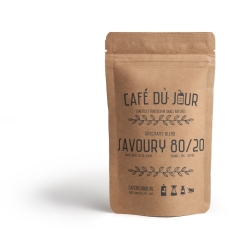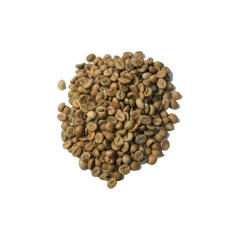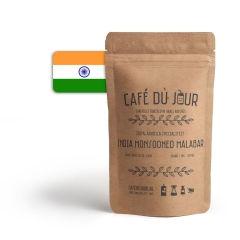India Arabica Monsooned Malabar AA ASPINWALL - unroasted coffee beans - 1 kilo


- 4 pieces23.35 93.40
- 8 pieces23.12 184.96
- 12 pieces22.88 274.56
- 16 pieces22.64 362.24
The India Monsooned Malabar is a special kind of coffee. Its origins date back to the 17th century when raw (green) coffee beans from India were shipped to Europe in wooden vessels. This was a challenging sea journey, taking about six months to reach Europe through the Cape of Good Hope. During this voyage, the raw coffee beans were exposed to the humid monsoon conditions.
The beans changed in colour, size, texture, and taste, resulting in a spicier and creamier coffee from India. With the advent of modern, more protective transport methods, the beans lost this unique character.
A method was developed to replicate these features in a controlled setting: during the monsoon season, the beans are stored in warehouses along the Malabar coast for about four to five months. These warehouses are partly open to let the moist monsoon winds blow through.
This coffee is sweet and creamy, powerful, with hints of spicy chocolate and nuts. In blends where you'd rather avoid using robusta, it works as a 100% arabica alternative.
Note: this coffee is unroasted and needs roasting before it's ready for consumption.
The India Monsooned Malabar is a unique coffee. The history of this coffee dates back to the 17th century. Back then, the raw (green) coffee beans from India were shipped to Europe in wooden vessels. This was a tough voyage, taking about six months to get to Europe around the Cape of Good Hope. Along the way, the raw coffee beans were exposed to the damp monsoon conditions.
The beans changed in colour, size, texture, and flavour. The coffee from India became spicier and creamier. With the arrival of modern and more protective shipping methods, the beans started losing their distinct character.
So, a method was developed to recreate these traits in a controlled setting: during the monsoon season, the beans are stored in warehouses along the Malabar coast for roughly 4 to 5 months. These warehouses are partially open to let the moist monsoon winds pass through.
A sweet, creamy coffee that's robust, with hints of spicy chocolate and nuts. In blends where you prefer not to use robusta, it can act as a 100% arabica replacement.
Just a heads up: this is an unroasted coffee that needs to be roasted before you can enjoy it.
| Product code | CDJ-OB-0010 |
|---|---|
| EAN | 8720598671162 |
| Brand | Café du Jour |
| Produced in | India |
Supplier Aspinwall & Co. Ltd. is one of the first commercial companies in Malabar, along the coast of South India, established in 1867 by the legendary English merchant and visionary, John H. Aspinwall.

















